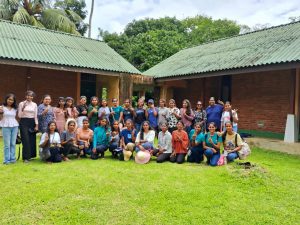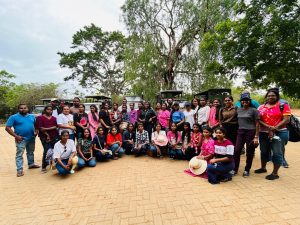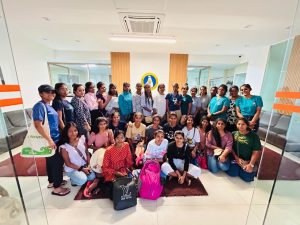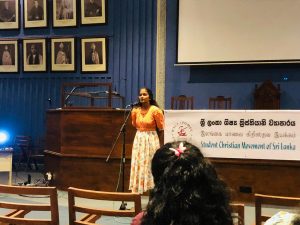The Department of Christian Civilization, University of Jaffna, in collaboration with the Student Christian Movement of Sri Lanka (SCMSL), participated in the inter-university workshop on “Climate Justice” from October 11 – 13, 2024. This workshop, designed as an experiential learning initiative, provided students with practical insights into climate-related issues while emphasizing faith-driven environmental responsibility.
The participation of 28 students from Level III and IV, accompanied by three staff members, was made possible through the efforts of Rev. Prof. J.C. Paul Rohan, Head of the Department, who completed the necessary formalities and secured permission from the University of Jaffna.
Journey and Accommodation
The journey began on October 10, 2024, at 7:30 p.m., when the students and staff departed from the University of Jaffna towards Galle, marking a symbolic movement from the northernmost to the southernmost part of Sri Lanka. The participants were accommodated at Bonavista (Diyalawela) in the Galle district, providing a conducive environment for discussions and reflection on the workshop’s themes.
Workshop Highlights
The three-day workshop featured a series of field visits, discussions, and interactive sessions, enabling students to connect their theoretical knowledge with real-world environmental issues.
Day 1: Field Learning and Community Engagement
Hiniduma Gin River Visit:
Participants visited the Hiniduma Gin River area, where they learned about illegal settlements disrupting its natural flow and the challenges faced by local residents due to climate-related disasters. This session provided insights into human-induced environmental damage and the urgent need for conservation efforts.
Fieldwork with Local Communities:
Students engaged in conversations with local residents, discussing the natural disasters they regularly encounter, including floods and landslides. These interactions highlighted the direct consequences of environmental negligence on vulnerable communities.
Visit to Andaradeniya Estate Tea Factory:
The group toured the Andaradeniya Estate tea factory, where they received a detailed explanation of the tea production process, including the 26 different grades of tea.
A particularly impactful part of the visit was the interaction with plantation workers, where students listened to their hardships and socio-economic struggles.
Many students noted that although they had previously visited tea estates, this experience was unique because they met the workers in their living quarters, gaining firsthand understanding of their challenges.
Day 2: Spiritual Reflection and Environmental Awareness
Morning Meditation at the Beach:
The second day began with a meditation session at 7:00 a.m. on the beach. A biblical reflection on nature was provided, emphasizing the spiritual responsibility of caring for creation. This session reinforced the idea that environmental protection is a moral and faith-driven duty.
Visit to Yala National Park:
The group visited Yala National Park, where they observed wildlife in its natural habitat. This experience helped students understand the importance of preserving biodiversity and protecting endangered species.
Day 3: Cultural and Historical Exploration
Exploration of Galle’s Colonial Heritage:
The participants visited Galle Fort, exploring key sites such as the Dutch Reformed Church, the Dutch Hospital, the Museum, and the Police Station.
This visit provided an opportunity to reflect on the historical relationship between colonialism, environmental changes, and religious heritage.
Ecumenical Gathering in Colombo:
The final session of the workshop took place at Borella, Colombo, where an Ecumenical Gathering was organized by SCMSL. Students actively shared their workshop experiences and engaged in a lively Q&A session, discussing their newfound perspectives on climate justice and faith-based environmental activism. A short cultural performance by university students added a joyful and celebratory touch to the evening.
The event concluded at 6:00 p.m., leaving participants enriched yet emotional, as the bonds formed over the three days made parting difficult.
Impact of the Workshop
The workshop deepened students’ understanding of climate justice, allowing them to witness firsthand the effects of environmental challenges on local communities and ecosystems.
The experience fostered leadership skills, encouraging participants to take active roles in environmental advocacy. The inter-university and inter-congregational nature of the gathering facilitated intellectual and cultural exchange, reinforcing the spirit of ecumenical dialogue.
Acknowledgments
The Department of Christian Civilization expresses its gratitude to the SCMSL, organizers, volunteers, and participants from various universities who contributed to the success of this workshop. This initiative has empowered students to become proactive advocates for climate justice, ensuring that faith and environmental stewardship go hand in hand.
The Department remains committed to engaging in meaningful, interdisciplinary learning experiences, equipping students with the knowledge and skills to address contemporary global challenges through the lens of Christian values.




